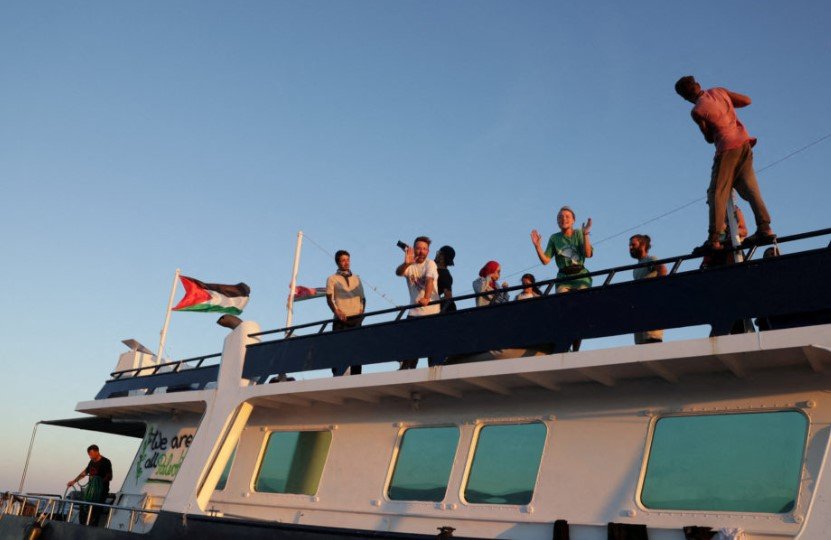Scottish activists detained by Israeli forces during a Gaza aid flotilla mission have been released and returned home or to nearby countries. The group, part of the Global Sumud Flotilla, faced interception last week while trying to deliver supplies to Gaza, leading to claims of mistreatment during their time in prison.
This event highlights ongoing tensions in the region, where aid efforts often meet resistance amid the blockade on Gaza. Activists like Margaret Pacetta, Yvonne Ridley, Jim Hickey, and Sid Khan shared stories of their ordeal, sparking global discussions on humanitarian access and detainee rights.
The Flotilla’s Mission and Interception
The Global Sumud Flotilla set sail in late August 2025 with hundreds of activists from various countries, aiming to break the Gaza blockade and deliver essential aid. Boats carried food, medical supplies, and other items to support people in the war-torn area.
Israeli naval forces intercepted the vessels in international waters, detaining over 400 participants, including 22 Americans and several Europeans. The operation drew attention when prominent figures like Swedish activist Greta Thunberg joined the group.
Scottish participants described the moment of interception as tense. Soldiers boarded the boats, ordering everyone to raise their hands while pointing weapons. One boat managed to throw supplies overboard, which local Gaza fishers later recovered using nets.

The flotilla’s goal was to challenge the long-standing restrictions on Gaza, which have limited aid since the conflict escalated in recent years. This mission follows similar efforts in the past, like the 2010 flotilla that ended in violence.
Detainees’ Experiences in Israeli Custody
Activists reported harsh conditions during their detention in Israeli prisons. Margaret Pacetta, a 71-year-old from Glasgow, said guards denied basic rights, including clean food and water, and subjected them to verbal abuse.
She recalled feeling scared as soldiers shouted threats, but emphasized that the group remained peaceful. Other detainees alleged being forced to hold Israeli flags or wear certain items, claims that Israel has called false propaganda.
Yvonne Ridley, 67, along with Jim Hickey, 52, and Sid Khan, 48, were released to Jordan after several days. They described overcrowded cells and limited access to medicine, echoing complaints from other international participants.
Greta Thunberg, deported earlier, spoke out about a genocide in Gaza and mistreatment, including being placed in infested cells. These accounts have fueled calls for investigations into detainee treatment.
Despite the challenges, Pacetta expressed relief at returning home but sadness for Gaza’s people. She noted that spirits among activists stayed high, refusing to be broken by the experience.
- Key claims from detainees include denial of proper food and water.
- Seizure of personal belongings and medicines.
- Verbal and physical intimidation by guards.
- Overcrowded and unsanitary cell conditions.
International Response and Diplomatic Moves
Governments worldwide reacted quickly to the detentions. Turkey arranged flights for many released activists, while Spain, Portugal, and Tunisia welcomed their citizens with heroes’ greetings.
The United States monitored the situation for its detained citizens, including a San Francisco captain held in prison. British officials pressed for the safe return of Scots, leading to their release without charges.
Human rights groups condemned the interceptions as violations of international law, arguing that aid missions in Palestinian waters should not face such force. Israel defended the actions, stating the flotilla posed a security risk and that aid must go through approved channels.
This incident comes amid broader 2025 events, such as increased aid convoys and UN resolutions calling for open Gaza borders. Recent data from aid organizations shows over 2 million people in Gaza rely on external support, with food insecurity at record levels.
Broader Impact on Gaza Aid Efforts
The flotilla interception underscores the difficulties in delivering aid to Gaza, where blockades have persisted since 2007. Recent reports indicate that only a fraction of needed supplies reach the area due to restrictions.
Activists argue these missions raise awareness and pressure for change. Past flotillas have led to temporary policy shifts, though long-term solutions remain elusive.
In 2025, global aid to Gaza has surged, with organizations like the UN delivering over 1,000 truckloads monthly. However, conflicts disrupt these efforts, leaving many without basics.
| Event | Date | Details |
|---|---|---|
| Flotilla Departure | Late August 2025 | Boats leave from various ports with aid and activists. |
| Interception | Early October 2025 | Israeli navy boards vessels, detains participants. |
| Initial Deportations | October 4-5, 2025 | Greta Thunberg and others sent to Turkey and Greece. |
| Scottish Releases | October 7, 2025 | Activists freed; some head to Jordan, others home. |
| Ongoing Aid Push | October 2025 | Calls for more missions despite risks. |
This table shows the timeline, highlighting how quickly events unfolded.
Looking Ahead for Activists and Aid
Released activists now focus on recovery and advocacy. Pacetta plans to continue supporting Gaza causes, urging more people to join peaceful efforts.
Experts predict more flotillas in the coming months, as public support grows. With winter approaching, aid needs in Gaza will likely increase, putting pressure on international leaders.
The incident may influence diplomatic talks, potentially leading to relaxed border policies. For now, it serves as a reminder of the human cost in the region.
Share your thoughts on this story in the comments below, and spread the word to raise awareness about Gaza aid challenges.
